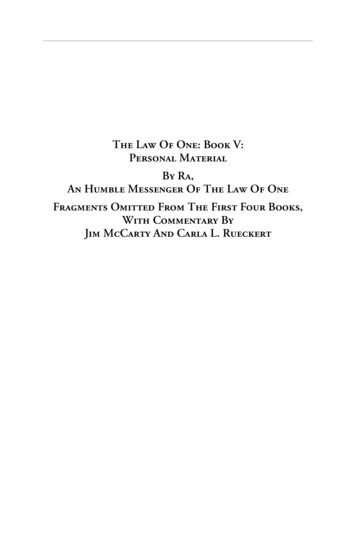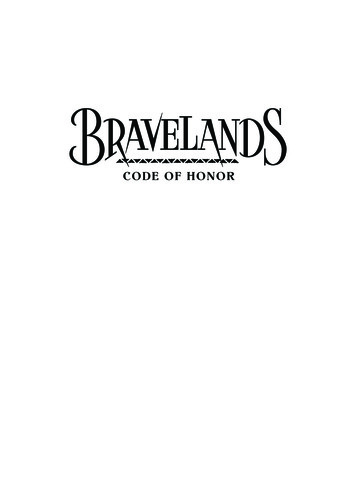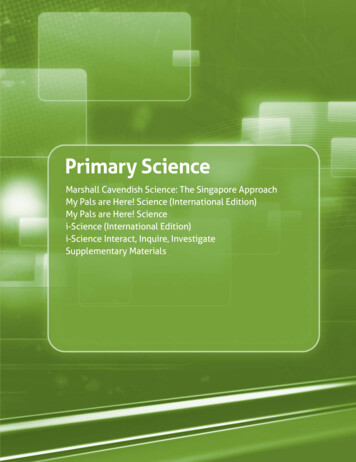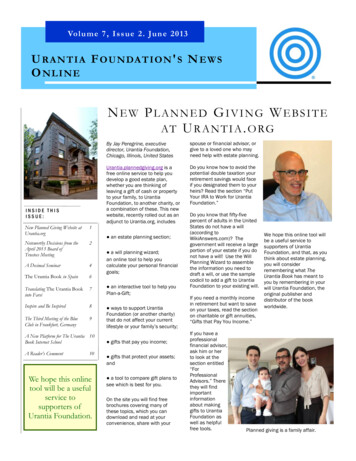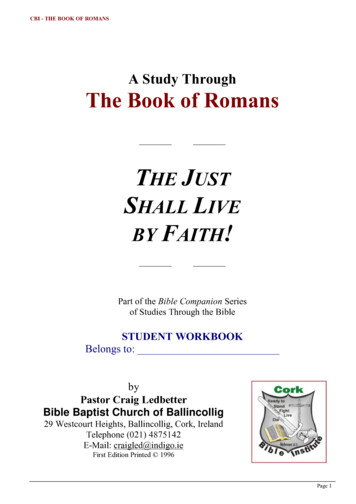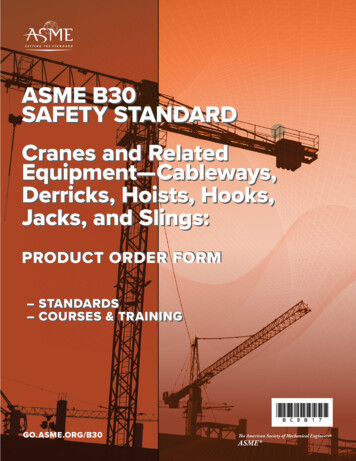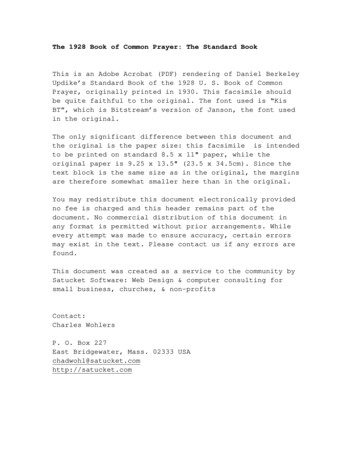
Transcription
BOOK 1: ONE BY ONE (4th Edition)Copyright 2015 by Global Leadership CenterAll rights reserved. No part of this publication maybe reproduced, stored in a retrieval system, ortransmitted in any form or by any means - electronic,mechanical, photocopy, recording, or any other,without the prior permission of GLC.2
TABLE OF CONTENTSIntroductionpage 4How to Use This Workbookpage 5Session 1:page 7One TruthThe GospelSession 2:One Waypage 15The SaviorSession 3:One Proofpage 25Our New Life in ChristSession 4:One Promisepage 33The Assurance of Our SalvationSession 5:One Sourcepage 43The Holy SpiritSession 6:One Pursuitpage 51Growing in Our Relationship with ChristWhat’s Next?page 61Suggested Answerspage 63Appendix A: What is the Best DecisionYou've Made in Your Life?page 69Appendix B: One-Minute WitnessTMpage 75Appendix C: Tips on Using the "What is the BestDecision You've Made in Your Life?" bookletpage 89Appendix D: How to Handle Different Responses tothe Invitation to Receive Christpage 91Appendix E: Evaluation Tool for Gospel Sharingpage 95Book 1: ONE BY ONE3
INTRODUCTIONA mere glance at the headlines will convince anyone that our world is introuble. From deadly viruses to terrorists who kill defenseless people;from tragic mass transportation accidents to corrupt governments andnatural calamities; we all have to live with these harsh realities everyday.With our increasingly interconnected global community, it would seemthat a problem in one part of the world can affect us who live thousandsof kilometers away. On the other hand, a positive difference made byone individual can make a difference to millions of people all over theworld. Just think of the technological, environmental, medical, and otheradvancements that help us lead better lives today.The question is, can any ordinary person make a lasting and life-changingimpact in our complicated, connected world today? More importantly,what is the most significant difference one can make in someone else’slife, in our search for peace, security and hope amidst our global-scaleconcerns?Welcome to Book 1: One by One. In here, we will explore together howlasting change can and should happen first in us, then in the worldaround us, as we go out and influence another one, then another one –one by one.Sounds like a fairy tale? Maybe not. In the series of conversations thatyou and I will have with this guide, you will discover that there is a greaterStory behind all the news that we hear today. This Story will change yourlife. The Solution to our greatest problem is probably something that youhave never known before.4
HOW TO USETHIS WORKBOOKThis workbook is for the GLC Essentials Book 1: One by One study. It canbe used as a stand-alone Bible study guide for small groups.If you are a small group servant/facilitator, all you have to do is make surethat you do a personal Bible study using this workbook ahead of yoursmall group meeting for preparation. Encourage your group members tohave their own workbooks. Do not divert the teaching topic – stick to whatis in the workbook.The workbook includes the Bible lesson, and individual and small grouplearning activities to help you get the most out of your meetings. Thereare five parts in every session: Explore, Examine, Express, Experience andEquip. Explore — contains individual and small group activities that helpprepare you for the Bible study. Examine — this is where you go through the Bible lesson withyour group. Express — this is where the members of the group get a chance toexpress more of their insights, questions and thoughts about theBible lesson. They can do it in writing, doodling or drawing, andsharing to the rest of the group. Experience — this section is accomplished outside the groupmeeting time. There are suggested individual or group Life Appsthat will hopefully help you experience life transformation as youapply God’s truth in practical ways. Equip – this section is to be accomplished by your small groupor Dgroup member with your coaching and mentoring. This is the"on-the-job" training for every member of a Dgroup to become adiscipler (someone who is a Christ-committed follower and helpsothers become Christ-committed followers also).This workbook is just a tool. We need to depend on the Holy Spirit toteach us God’s truth and transform our hearts as we go through the Biblestudies.So, come and discover the One who will change your life!Book 1: ONE BY ONE5
SESSION 1ONE TRUTHThe GospelWhat is the gospel?The word “gospel” in Greek* literally means “good news.” The questionis what is the “good news”? The answer to this and most of our questionsabout the Christian faith are found in the Word of God, the Bible. We willdiscover, by studying the Bible, answers to questions concerning howJesus truly is relevant to our lives – how He loves us, and how He cantruly transform our lives.*see note on page 107
EXPLOREGood NewsForm a group of 3-4. Give time for each one to introduce themselves.They will also share something based on the last digit of their birth year.Be guided by the following criteria (to be flashed):If your birth year ends with:0-1 : Something good that happened to you today2-3 : Something good about your family4-5 : Something good that you will like to eat for breakfast6-7 : Something good about your work or school8-9 : Say something good about the person to your rightLEARNING NUGGETPeople love to share good things that has happened to them. The Bibletells about the greatest news that mankind has ever received. But the bigquestion is, what is the" good news" and why is it so?8
EXAMINETHE GOOD NEWSGod desires to have a relationship with you!God loves usRead 1 John 4:8–91. What does this verse tell us about God’s basic nature?Read John 10:102. In your own words, what do you think Jesus meant when He said thatHe came to give us an abundant life?While God is loving, He is also holyRead 1 Peter 1:153. How is God described in these verses? What does it mean that Godis holy?So far we have seen that God is loving but He is also holy.In the following verses, we will see how these two aspectsof God’s nature are both involved in the Good News. Buthow does this relate to us?Our Problem: Sinful and Opposed To God4.How does Isaiah 53:6 describe us prior to placing our faith in Christ?Book 1: ONE BY ONE9
Read James 2:105. Is there any difference between breaking one commandment andbreaking all the commandments? How would this affect people whothink they are basically good?Read Romans 6:236. What is the consequence of our sin? Is anyone exempted from thesentence that has been handed down to us? Why or why not?eNotIn the Greek language, in which the New Testamentwas originally written, death meant separation –spiritual death means eternal separation from God.Most people have the perspective that theybasically are good, and somehow God shouldaccept us because of His great love for us. But ifwe compare ourselves with the perfect holiness ofGod, our goodness is not enough. Sin separates usfrom God; it is rebellion against Him. Sin is basicallychoosing self-will over God’s will.So far this doesn’t sound like very good news.Though God desires to have a relationship with us,we are cut off from Him because of our own sin andrebellion. Is there any solution to our dilemma?10
God sent Jesus to pay the penalty for our sin7.What do Romans 5:8 and John 3:16 say that God has done?Sacrifice of His SonThe story is told of a drawbridge operator whose jobwas to lower the bridge each day before the arrival of apassenger train, then raise it again for the ships in theriver below to continue plying their trade. Each day ashe lowered the bridge, the passengers in the train wouldsmile and wave as they passed over his bridge.One day the drawbridge operator brought his son to workwith him. He showed him the huge gears and pulleys usedto raise and lower the bridge, and the beautiful view ofthe river valley and the many ships that passed under thebridge. As he prepared to lower the bridge for the dailytrain, he heard a terrifying noise – his son had fallen intothe gears of the draw bridge and could not free himself!As the oncoming train barreled on, he was faced with adilemma – he could either go and free his son, knowingthat hundreds of people would die as the train would smashinto the raised drawbridge; or he could continue to lowerthe drawbridge, knowing that it would cost his son his life.With tears in his eyes, he chose to lower the drawbridge– sacrificing his own son for the lives of those on the train.Book 1: ONE BY ONE11
Another Death SentenceOn the 14th of June 1830, US President Andrew Jacksongranted pardon to convicted robber George Wilson whowas handed the death sentence by the circuit court of theeastern district of Pennsylvania. However, on October 21,1830, George Wilson appeared in court and said that "hehad nothing to say, and that he did not wish in any mannerto avail himself. of the pardon referred to." Sadly, evenif pardon from the death sentence was available for Mr.Wilson, "the court cannot give the prisoner the benefit ofthe pardon, unless he claims the benefit of it, and relies onit by plea or motion. It is a grant to him. he may accept itor not, as he pleases."Source: 50It seems impossible to believe, but many today do not accept theforgiveness that Jesus offers. Some may be too proud to accept that they need God’spardon. Some feel they have to do something to make themselvesworthy first before accepting pardon. Some think there is another way to be pardoned, and insiston doing it their way.We all have the choice to accept or reject the offer Jesus gives us. Haveyou ever made a decision to accept His gift of forgiveness?12
If you have not, you can accept that gift right now by faith. One way toexpress our faith in Christ is through prayer. Prayer is simply talking toGod, and expressing to Him the desires of our hearts. You can open yourheart to God right now and accept His gift of salvation through a simpleprayer of faith. Pray something like this:Prayer:Lord Jesus, thank You so much for loving me. I am so sorry formy sins. Thank You for dying on the cross for all of my sins.With Your help, I will turn away from all my sins. Today, I trustin You to be my Savior and Lord. And I receive You into myheart. Thank You for forgiving my sins and for coming into myheart. I accept Your free gift of eternal life. Thank You that oneday, I will go home to You in heaven. From this day on, I willfollow and obey You. Amen.Book 1: ONE BY ONE13
EXPERIENCEIf you made the choice to trust in Christ as your Savior and Lord, enteringinto an eternal relationship with God, read and sign the pledge below as areminder of your commitment today:“Today, Jesus, I trusted in You to be my Savior and myLord and I accepted Your free gift of eternal life. I committo love and obey You for the rest of my life.”SIGNEDDATEEQUIPOn-the-Job Training (15 minutes)Your discipler will read through the “What is the Best Decision You'veMade in Your Life?” booklet with you. This booklet is what we often useat CCF to share the gospel with our loved ones, friends, co-workers, etc.(See Appendix A).Observe carefully how he/she does it.
SESSION 2ONE WAYThe SaviorHow many ways are there to salvation?There are many views on how to be saved and how to be certain of oureternal destiny before God. Most of them have a ring of truth. Yet whenwe think a little more deeply, we find that many are in conflict with whatGod Himself has revealed to us in His Word. The Bible gives us the onlycertain knowledge of how salvation is possible. It corrects many of ourwrong ideas about being saved. What are some of the common thoughtsor feelings we have concerning our salvation?15
EXPLOREI've Been Wrong BeforeTake turns in your small group to answer the questions: Have you beenwrong about something you felt and believed was so right before? Whatwas that wrong belief?i.e. I used to think that sleeping with wet hair would cause blindness.I used to believe that Santa Claus was a real gift-giver.LEARNING NUGGETSome wrong beliefs may not cause us too much harm – like believing theTooth Fairy will give us a coin for each tooth we lose, etc. Other wrongbeliefs can have more devastating consequences, such as jumping off atall building and flapping your arms believing that you were born to fly. Onthe other hand, right beliefs will lead to good consequences for us, suchas correctly believing that eating more fruits and vegetables will help uslive healthier lives. When it comes to spiritual things, what we believe inwill have serious consequences not only in this life, but for eternity.16
EXAMINEHave you ever had thoughts like these?I. “God will save me, after all I am not so bad.”Perhaps you have heard or even thought, “God wouldn’t send him tohell, he is basically a good person.” Or, “I may not be perfect, but I am alot better than she is even if she goes to church all the time.”In both cases, our standard for determining whether someone shouldbe saved is how good they are compared to other people we know.We think that someone who is relatively good by human standards is abetter candidate for heaven than someone who is not so good. But thisis not what the Bible teaches.Read Romans 3:10–121. What do these verses tell us about human goodness?No one would disagree that some people are better than others.Yet when God judges us, He does so by a completely differentstandard.Read James 2:102. According to this verse, what is the result of breaking God’s laweven one time?These verses make it clear that being good compared to otherpeople is insufficient to qualify one for salvation. To be qualifiedfor salvation through one’s own effort, one would have to be asholy as God Himself.Book 1: ONE BY ONE17
Many Jews in the time of Christ had this perspective. Paul, before hisconversion to Christ, was one of them. But, after coming to faith in Christ,his outlook changed dramatically.Read Galatians 2:15–16Read Luke 18:9-143. Jesus contrasts two people in this story. What was the Phariseelike? What was the tax collector like? Who was declared righteous(justified) before God? Why?II. “God will save me if I do enough good works.”Many people think God will judge us with a set of scales that compareour good deeds with our bad deeds. But that is not the picture of thebasis of our standing before God as it is found in the Bible.Read Ephesians 2:8–104. According to verse 9, can we earn our salvation through goodworks – i.e., doing kind deeds, going to church, etc.? How is aperson saved? Based on this, how would you define grace?5. Salvation is a gift because Jesus paid for it by His death on thecross. How do you receive a gift? Do you have to pay for a gift?18
Based on the above verses, which is God’s formulafor salvation?A. FAITH IN JESUS GOOD WORKS SALVATIONex. GOOD WORKS (charity, prayer, good deeds vs. sin)B. FAITH IN JESUS SALVATION which results in good workThe correct formula is B.It is clear from the Bible that salvation is not the result ofour good deeds. We can never be good enough to pleaseGod because He is righteous and holy, and we are not. Thisrealization often leads us to the next perspective concerningsalvation: “I couldn’t possibly be saved because I am so bad.”III. “God could never save me. I am too bad to be saved.”Perhaps this is how you feel today. This perspective is based on thevery same assumption as the perspective that “God can only save thosewho are somehow good enough to gain His favor”. But, as we have seenabove, is this true?Book 1: ONE BY ONE19
The Thief on the CrossRead Luke 23:39–436. What were Jesus’ companions at the crucifixion like? Were theybasically good people? What did Jesus promise to the criminalthat asked Him for mercy? Did he do anything to make himselfworthy of salvation? What did he demonstrate when he askedJesus to remember him when Jesus goes to paradise?God’s Perspective on SalvationRead Psalm 103:8–137. What do these verses say about the forgiveness God offers?Have you ever placed your faith in Christ alone for salvation?If you have not done so, would you like to right now?If you would like to do so, simply pray in faith asking Him to comeinto your life as your Savior and Lord as the prayer from the end ofSession 1 indicates.If you have already done so, thank God that He has saved you,forgiven your sins and given you a new life.20
EXPERIENCEWhich of the wrong perspectives about salvation have you believed inthe past? Now that you know how you can be saved, what will you dodifferently this week?Ephesians 2:10 says that one result of having faith in Christ is that we cando good works that He created for us to do. What good thing will you dothis week that will show your faith in Jesus?Book 1: ONE BY ONE21
EQUIPOn-the-Job Training (30 minutes)Last week, your discipler read through the "What is the Best DecisionYou've Made in Your Life?" booklet with you. Now it’s your turn to readthrough it with your discipler. Simply read the booklet the way yourdiscipler did it with you before. (See Appendices C and D for helpful tips inusing the "What is the Best Decision You've Made in Your Life?" booklet.)When you’re done, your discipler will give you a few observations on how youdid reading through the booklet. (See Appendix E for the evaluation tool.)Practice the Pray-Care-Share principle (page 23) in reaching peoplearound you with the gospel of Christ.22
A SIMPLE ACTION PLAN:PRAY, CARE, SHAREPray – Pray for people, and pray with people. First make a list of 10people that you will begin praying for them to come to Christ. Thenlook for opportunities to pray with them. While some people may not beimmediately open to talking with you about spiritual things, many will bewilling to allow you to pray for them. Simply ask them, “What can I pray foryou?” When they tell you, pray for them. Then check back and see howGod has answered your prayer.Care – Show tangible concern for people. Look for ways that you can goout of your way to do something kind for them. There are many ways –treating them out for coffee, bringing food when they are sick, giving thema small gift or sending an encouraging text. They may wonder why you aredoing it – if they ask, tell them that you just love them, and wanted to showyour love in a tangible way.Share – Share the gospel with them when the Lord gives you theopportunity. There are many ways to share. Here are two:1."What is the Best Decision You've Made in Your Life?" CCF hasdeveloped a simple presentation in booklet form, which you canread through with a friend to explain the message of the gospel,and lead a person to faith in Christ.2. One by One. Now that you have gone through One by One, youcan help others who don’t know Christ yet by going through it withthem. The first two lessons explain the gospel and how a personcan put their faith in Christ.The PCS Packet contains the tools you need to help you do Pray-CareShare wherever you are. You may purchase it at the CCF Center Bookstoreor CCF Admin.Book 1: ONE BY ONE23
Make a list of ten people with whom you will practice Pray, Care, Share.PRAYI WILLPRAY FOR.1.2.3.4.5.6.7.8.9.10.24GeorgeCAREWHENHOW IWILL CARETues,8pmTreat forcoffeeSHAREWHENWHAT I WILLUSE TO SHAREWHENSept. 9My testimonyOct. 30
SESSION 3ONE PROOFOur New Life in ChristHow can I know if I have eternal life?In the first two sessions, we saw that the Bible is very clear – one cannotbe saved on the basis of doing good deeds, being religious, or trying tomake up for our sin through religious rituals. We are saved by God’s gracethrough faith alone in Christ’s sacrifice for our sin. It is not because we aregood that we are saved, but because God is good, and He made a way forus to be saved.At the same time, the Bible warns us that not everyone who thinks they aresaved will actually experience eternal life.Matthew 7:21 says that not everyone at the final judgment who says to Him“Lord, Lord” is truly saved. Can we know for sure?25
EXPLOREAs a group, come up with at least ten (10) movies, TV series or songs thathas a theme of living forever, immortality, and eternal love in its plot. Forexample, in the 80's, the movie Karate Kid II (1986) has the theme song byPeter Cetera, "Glory of Love" and the chorus has the line,We'll live foreverKnowing togetherThat we did it allFor the glory of love.Consider locally-produced songs, movies and TV series as well as foreignones from past decades until the present.LEARNING NUGGETNo matter what era you're from, you will come across the theme of "eternallife" or "eternal love" in popular media. This only shows that people fromall ages and all cultures has a deep-seated wish or longing for life to go onforever. Jesus Christ (7-2 BC to 30-33 AD) made the bold claim that He isthe source of eternal life. It is a claim that is at the least, interesting enoughto investigate that you might find something to seriously consider.26
EXAMINEWE CAN KNOW!Read 1 John 5:11–131. What do these verses promise us? According to this passage, whohas been given eternal life? Is it possible to know that you haveeternal life? How can a person be sure?Knowing the ShepherdOne of the most powerful illustrations of the certainty of our relationshipwith Christ is His story of the Good Shepherd.Read John 10:11–14; 27–302. What is the difference between the good shepherd and the“hireling?” What will the hireling do when things are not goingwell? What will the Good Shepherd, Jesus, do for the sheep?3.What is the guarantee that we will never be taken from His hand?Book 1: ONE BY ONE27
The proof of our new life in ChristOne way to be confident of our relationship with Christ is to see tangibleevidence – a transformed life. The Bible mentions several ways that wecan recognize that God really has entered our lives, and is beginning toaccomplish His work within us.Read 2 Corinthians 5:174. What does this verse say we are if we have Christ in our lives?After receiving Christ into your life, what do you expect to happenin your life?Two markers of our new life: Obedience and LoveRead 1 John 2:3–65. How can we say we really know God? What evidence did John sayshould be seen in a person’s life as a fruit and proof of his faith?Read 1 John 2:7–116. How should we relate to one another? How is that a demonstrationof our relationship with Christ?28
Read Titus 2:11–127. How does grace work in our lives?As you can see in these verses, changes are to be expected as a resultof our experience of God’s saving power in our lives. The Bible tells usthat true believers will be transformed – they will want to obey whatGod desires, and will begin to love others in ways they may have neverexperienced before.While we will never be perfect, people who have a relationship with Christwill continue to grow in Christlikeness.Are you beginning to see the work of God in your life? If you are beginningto see these changes take place, you can be sure that you have begun alasting and eternal relationship with the Good Shepherd!Take a moment to pray and thank God for the changes He is beginning tobring. If you are yet to experience any of these, ask Him to help you trustHim to begin His work within you.Book 1: ONE BY ONE29
List down some changes you see in yourself:Examples: Love for others, desire to learn more about God30
EXPERIENCE1.How has this change in attitude been good for you? In what way/s hasit been a challenge for you?2. How has this change been translated into your actions?Book 1: ONE BY ONE31
EQUIPOn-the-Job Training (30 minutes)Your discipler will take you through the One-Minute-Witness training. (SeeAppendix B).Practice your one-minute witness skills with other people that you knowthis week; perhaps you can ask someone in your family to help youpractice your skill.Continue to apply the Pray-Care-Share principle as you reach people withthe gospel.32
SESSION 4ONE PROMISEThe Assurance ofOur SalvationIn the previous session, we learned that we can have the wonderfulassurance of having a permanent relationship with God. At times we mightfeel otherwise – that perhaps we may disappoint Him, and that somehowthat relationship will change. What does the Bible say about such fears?33
EXPLOREIn your small group, take turns sharing your answer to the questions below:What are one or two things in your life that you are quite assured of?What are one or two things in your life that you wish you were assured of?LEARNING NUGGETA promise is only as good as the one who gives it. We may make promiseswe intend to keep, but because human beings have many limitations, wedo not have the ability to keep all of our promises and thus we cannot givetotal assurance to someone that things go the way we promised them.Only our All-Powerful and sovereign God can totally assure us that all hispromises will come true.34
EXAMINEHe promises He will never leave usRead Hebrews 13:5–61. What does God promise that He will never do?2. What does this mean for our relationship with Christ?“But what if I disobey Him?”It is great to know that Christ promises to NEVER leave us once we beginour relationship with Him. But what if we sin or disobey Him? What happensto our relationship with Christ?If you have accepted Christ as your Savior and Lord by faith, then youhave become a follower of Christ – a Christian. You have become a son ordaughter of God.In John 1:12-13 we are told:12Yet to all who received him, to those who believed inhis name, he gave the right to become children of God –13children born not of natural descent, nor of humandecision or a husband’s will, but born of God.Our relationship with God is permanent. It will never change. But sometimesthere are problems and conflicts within a family that affect the way werelate to each other. The Bible gives us a powerful picture of that reality ina famous story told by Jesus.Book 1: ONE BY ONE35
The Story of the Prodigal SonRead Luke 15:11–243. What was the relationship between the two main characters inthis story? After the younger son left his father, did his positionas his father’s son ever end? How do you think the prodigal son’sactions affected their relationship as father and son first when heleft home, and later when he went back to his father?You and the ProdigalThis story is a picture of our relationship with God. Weare His children because we have received Christ intoour lives (John 1:12). He has promised never to leave usor abandon us (Hebrews 13:5). Yet we can (and oftendo) commit sin. Does our relationship with Him change?This story beautifully illustrates the answer. Evenwhen he dishonored his father and squandered hisinheritance, the prodigal never stopped being hisfather’s son. In the same way, even when we sin we arestill God’s children. Our relationship does not change.What changes is our fellowship with Him. Sin makesus ashamed and feel distant from God. We cease toenjoy a close or intimate relationship with our HeavenlyFather, but we do not lose our relationship with Him.God is ready and waiting for us to return to Him andrestore the joy of our salvation. We need to return toour Father, humble ourselves before Him, and ask Himto forgive us.36
Restoring our fellowship with GodHow can we restore fellowship with God when we have sinned?Read 1 John 1:8–94. What should we do if we sin against God? What does this versepromise that God will do if we confess our sins to Him?Read 1 Timothy 2:5–75. Who is the one mediator between God and man (a mediatoris someone who stands between two parties in order tofacilitate an agreement)? What are the implications of thisconcerning confessing your sins?Hebrews 10:19–22 says that Jesus made a way for us to go directly toGod. This means we have the great privilege of approaching God humbly,yet confidently.The Bible tells us that we can restore our fellowship with Jesus by goingdirectly to God, asking His forgiveness, and once again seeking to serveand follow Him. We do not need to go to anyone else to confess our sins,and we do not need the intervention of any other intermediary – we havethe privilege of going straight to our heavenly Father, who welcomes usback into fellowship with Himself through Jesus Christ our mediator.But wait This sounds too easy. Can’t this be abused? If God will forgive us anyway,doesn’t that mean we can sin whenever we want?Book 1: ONE BY ONE37
It is possible to come to the wrong conclusion that, since God isgracious and forgives all of our sins, then we can deliberately sin withoutconsequences. But this is not what the Bible teaches.Read 1 John 3:6, 9–106. According to these verses, what do God’s children practice? Howdoes this relate to people who think they can sin whenever theywant because they know God will forgive them?Read Hebrews 12:9–117. What do fathers do to help their children grow up to live well asadults? What does it mean that God disciplines us? What is Hispurpose in disciplining us?Ever wonder if you can do whatever pleases you without regard for God’swill? Consider what Galatians 6:7–8 says:“Do not be deceived, God is not mocked; for whatever a mansows, this he will also reap. For the one who sows to his ownflesh will from the flesh reap corruption, but the one who sowsto the Spirit will from the Spirit reap eternal life."These verses tell us two things.First, true believers will never invoke God’s promise of grace andforgiveness as an excuse to live a life of sin. Such a lifestyle actually pointsto another possibility: perhaps such a person does not even know Christ.Second, these verses teach us that there are consequences fordisobedience and sin. Even if God loves and forgives us, when we disobeyHim we will experience the painful effects of our disobedience. God alsopromises to discipline us when we disobey. Just like a loving father will38
discipline his children
Book 1: ONE BY ONE EXAMINE THE GOOD NEWS God desires to have a relationship with you! God loves us Read 1 John 4:8–9 1. What does this verse tell us about God’s basic nature? Read John 10:10 2. In your own words, what do you think Jesus meant when He said that He came to give us an abundant life? While God
